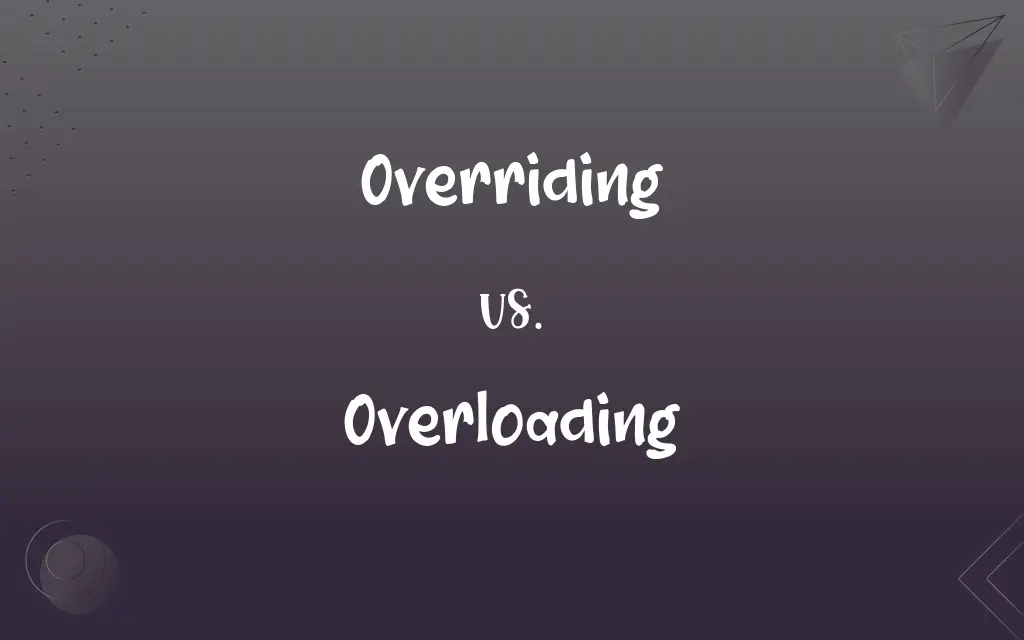Overriding vs. Overloading: What's the Difference?
Edited by Janet White || By Harlon Moss || Updated on October 16, 2023
Overriding provides a new implementation for an inherited method in a subclass. Overloading allows multiple methods with the same name but different parameters in the same class.

Key Differences
Overriding is a concept rooted in object-oriented programming. It allows a subclass to offer a specific implementation of a method already provided by its parent class. On the contrary, overloading does not concern inheritance but is about defining multiple methods in the same class with the same name but with different parameters.
In overriding, the method in the subclass should have the same name, return type, and parameters as the method in the parent class. Overloading, however, is about the flexibility of method invocation. It allows different methods to have the same name as long as they have a different set of parameters, differentiating them from each other.
It's crucial to understand that overriding is closely related to runtime polymorphism. It's during the execution of the program that the JVM decides which method to call, based on the object's type. Overloading, on the other hand, relates to compile-time polymorphism. The method invoked is determined at compile time based on the method signature.
Another crucial distinction is that overriding is governed by specific rules. For instance, the access privilege of the overriding method can't be more restrictive than the overridden method. Overloading, in contrast, isn't constrained this way. As long as methods have a distinct parameter list, they can be overloaded irrespective of their access privileges or return types.
Comparison Chart
Definition
Provides new implementation for an inherited method.
Allows multiple methods with the same name but different parameters.
ADVERTISEMENT
Related to
Runtime polymorphism
Compile-time polymorphism
Method Name & Type
Must be the same as the parent class
Must be the same but parameters can differ
Access Privileges
Cannot be more restrictive than the parent class
No specific constraint
Use Case
Specific implementation in subclasses
Flexibility in method invocation with different parameters
Overriding and Overloading Definitions
Overriding
It provides a mechanism to achieve runtime polymorphism in object-oriented languages.
By overriding the move method, the car object at runtime behaves differently from the vehicle object.
ADVERTISEMENT
Overloading
Overloading allows defining multiple methods with the same name but different parameters within a class.
The display method can be overloaded to show either text or images based on the provided parameters.
Overriding
Overriding ensures that the method signature remains consistent across parent and child classes.
The overriding calculate method in the finance module retains the same parameters as in the base module.
Overloading
Overloading is independent of method return types, focusing solely on parameter differences.
The overloading retrieve method can return a string for one set of parameters and an integer for another.
Overriding
Overriding enables a subclass to either extend or replace functionalities of its superclass.
The game character's attack method, when overridden, uses a different weapon than the one specified in the general character class.
Overloading
Overloading is a form of compile-time polymorphism in programming languages.
Through overloading, the merge function can combine either two lists or two strings during compile time.
Overriding
It's a way to provide a specific behavior in a subclass while adhering to a general contract set by the parent class.
Overriding the printInfo method lets the student object provide specific details while following the structure set by the person class.
Overloading
It lets programmers utilize the same method name in different contexts, enhancing code readability.
By overloading the filter method, users can easily understand its purpose, whether it's filtering names or dates.
Overriding
Overriding allows a subclass to offer its version of a method present in its parent class.
In the derived class, the draw method overriding the one in the base class gives a different output.
Overloading
It provides flexibility in method invocation by allowing varied arguments.
The overloading of the add function lets it work with both integers and decimals.
Overriding
First in priority; more important than all others
Our overriding concern is the eradication of illiteracy.
Overloading
To load too heavily.
Overriding
Present participle of override
Overloading
An excessive load.
Overloading
(object-oriented) A type of polymorphism, where different functions, operators or variables with the same name are invoked based on the data types of the parameters passed.
Overloading
The loading of a vehicle etc. with too heavy a weight.
Operators can be fined for overloading of vehicles.
Overloading
Present participle of overload
FAQs
Is the return type considered when overriding a method?
Yes, in many languages, the return type should match when overriding a method.
Can overloading occur across multiple classes?
No, overloading is typically confined to a single class with methods differing in parameters.
Can we overload a method based on return types?
No, overloading is based on parameter differences, not return types.
What is overriding in programming?
Overriding allows a subclass to provide a specific implementation of a method already defined in its parent class.
Why is overriding important in object-oriented programming?
Overriding supports polymorphism, allowing subclasses to provide specific behaviors while adhering to a general structure set by the parent class.
Is it possible to overload constructors?
Yes, constructors can be overloaded with different parameters to instantiate objects in various ways.
Why can't we override static methods?
Static methods belong to the class, not an instance. Thus, their behavior isn't subject to change based on object state.
Is it necessary for the overridden methods to throw the same exceptions?
In many languages like Java, the overriding method should not throw broader exceptions than the overridden method.
How is overloading different from overriding?
Overloading allows multiple methods with the same name but different parameters, while overriding provides a new implementation for an inherited method.
What's the main advantage of method overloading?
It increases code readability and reusability by allowing the same method name to work in different contexts.
How does method overloading support flexibility in programming?
It allows programmers to define methods that perform similar tasks but handle different data types or different numbers of arguments, providing adaptability in method invocation.
What happens if we try to override a method without matching its signature?
It won't be considered as overriding; instead, it may be treated as overloading if the parameters differ.
Does overriding affect method accessibility?
Yes, the overriding method cannot have more restrictive access than the method it overrides.
How do languages like Java support overriding?
Java uses the @Override annotation to indicate a method is intended to override a method in a superclass.
How does the compiler distinguish between overloaded methods?
It differentiates based on the number, type, and sequence of parameters in the method signature.
Can a static method be overridden?
No, static methods belong to the class, not instances, and thus cannot be overridden.
Can you provide an example of a scenario where overloading is useful?
In a graphics program, a draw method can be overloaded to handle shapes like circles, rectangles, or lines based on different parameters.
Does method overriding mean the original method disappears?
No, the original method still exists, but the subclass version takes precedence when invoked using a subclass object.
Can we overload methods based solely on return type differences?
No, the methods must differ in parameters, not just return types, to be overloaded.
Can we overload main() method in Java?
Yes, the main method can be overloaded, but the JVM only calls the one with a single argument of type String[].
About Author
Written by
Harlon MossHarlon is a seasoned quality moderator and accomplished content writer for Difference Wiki. An alumnus of the prestigious University of California, he earned his degree in Computer Science. Leveraging his academic background, Harlon brings a meticulous and informed perspective to his work, ensuring content accuracy and excellence.
Edited by
Janet WhiteJanet White has been an esteemed writer and blogger for Difference Wiki. Holding a Master's degree in Science and Medical Journalism from the prestigious Boston University, she has consistently demonstrated her expertise and passion for her field. When she's not immersed in her work, Janet relishes her time exercising, delving into a good book, and cherishing moments with friends and family.































































